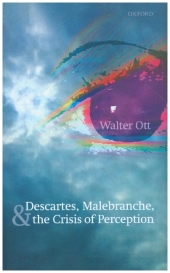 Neuerscheinungen 2017Stand: 2020-02-01 |
Schnellsuche
ISBN/Stichwort/Autor
|
Herderstraße 10
10625 Berlin
Tel.: 030 315 714 16
Fax 030 315 714 14
info@buchspektrum.de |

Walter Ott
Descartes, Malebranche, and the Crisis of Perception
2017. 260 S. 223 mm
Verlag/Jahr: OXFORD UNIVERSITY PRESS; OUP OXFORD 2017
ISBN: 0-19-879171-2 (0198791712)
Neue ISBN: 978-0-19-879171-3 (9780198791713)
Preis und Lieferzeit: Bitte klicken
Seventeenth-century French philosophers grappled with a lasting problem: how do we use qualities such as color, feel, and sound to locate objects in the world, even though these qualities are not real? Walter Ott explores the debate about perceptual experience, covering Descartes and Malebranche alongside their less known contemporaries.
The seventeenth century witnesses the demise of two core doctrines in the theory of perception: na‹ve realism about color, sound, and other sensible qualities and the empirical theory, drawn from Alhacen and Roger Bacon, which underwrote it. This created a problem for seventeenth century philosophers: how is that we use qualities such as color, feel, and sound to locate objects in the world, even though these qualities are not real?
Ejecting such sensible qualities from the mind-independent world at once makes for a cleaner ontology, since bodies can now be understood in purely geometrical terms, and spawns a variety of fascinating complications for the philosophy of perception. If sensible qualities are not part of the mind-independent world, just what are they, and what role, if any, do they play in our cognitive economy? We seemingly have to use color to visually experience objects. Do we do so by inferring size, shape,
and motion from color? Or is it a purely automatic operation, accomplished by divine decree?
This volume traces the debate over perceptual experience in early modern France, covering such figures as Antoine Arnauld, Robert Desgabets, and Pierre-Sylvain Régis alongside their better-known countrymen René Descartes and Nicolas Malebranche.
[Walter Ott´s] work is commendable for the very careful attention he pays to the texts. ... the picture that Ott draws, of an optimistic theory of perception, based squarely on a view of what the physical world is like and how it operates, that gradually, as the need for ever more complicated mental processes unfold, lost contact with that physical world, is a fascinating one, and Ott´s book deserves the same close and careful study he himself put into it. Margaret Atherton, Notre Dame Philosophical Reviews
Walter Ott is the author of Causation and Laws of Nature in Early Modern Philosophy (Oxford University Press), Locke´s Philosophy of Language (Cambridge University Press), and numerous journal articles. He taught at Colby College, East Tennessee State University, and Virginia Tech before joining the faculty of the University of Virginia.


